The German Shepherd Poodle mix, also known as a Shepadoodle, is a crossbreed that combines the intelligence and protective nature of the German Shepherd with the hypoallergenic and non-shedding coat of the Poodle.
This hybrid breed has gained popularity recently as a family pet and a service dog due to its affectionate and loyal personality and versatility in performing various tasks. While relatively new, the Shepadoodle has quickly become a favorite among dog lovers who appreciate its unique combination of traits and charming appearance.
In this article we will explore this fascinating breed’s history, characteristics, and care requirements.
A Brief Overview of German Shepherd Poodle Mix
| German Shephard Poodle Mix | |
| Other Names | German Sheeppoodle, German Poodle, German Poodle Mix, GSD Poodle Mix, Germandoodle, Shepadoodle Mix, Shepapoo |
| Purity | Crossbred |
| Purpose | Companion, working |
| AKC Recognition | No |
| Size | Small, medium, or large |
| Weight Range | 25-90 pounds |
| Height Range | 13-26 inches |
| Coat Colors | Black, white, fawn, tan, grey, cream, brown |
| Lifespan | 12-14 years |
| Average Puppy Cost | $600-$2,000 |
What is a German Shepherd Poodle Mix?
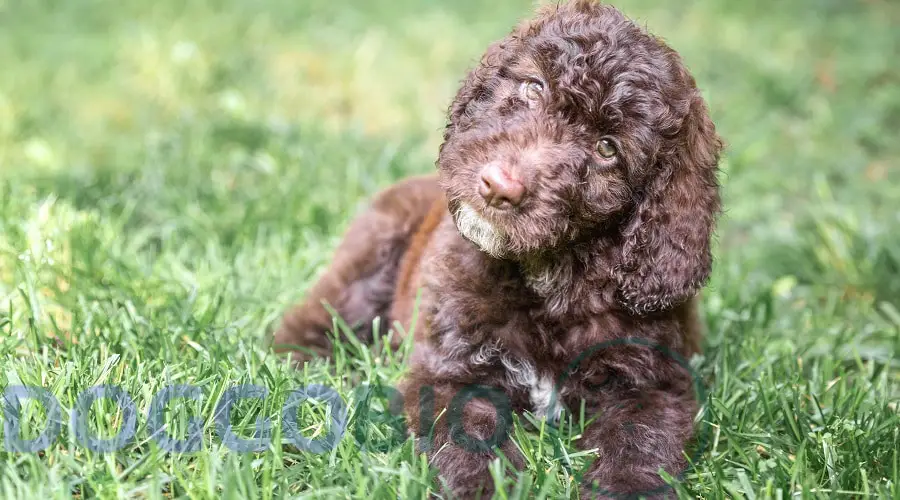
The German Shepherd Poodle Mix, also known as the Shepadoodle, is a remarkable canine hybrid that merges the exemplary traits of the brave German Shepherd and the ornate Poodle. The Shepadoodle, revered for its immense loyalty and unmatched intelligence, is a delightful breed that continues to captivate dog enthusiasts and breeders alike.
Parent Breeds of German Shepherd Poodle Mix
Origins and History of German Shepherd
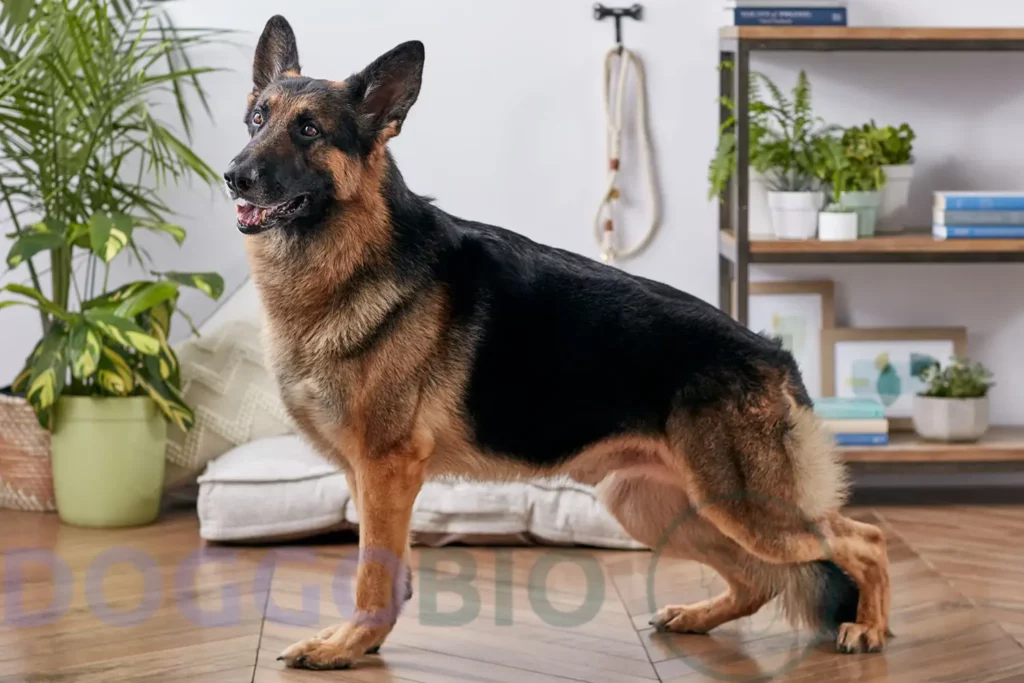
The history of German Shepherds is fascinating! These pups were developed in Germany during the late 1800s to herd sheep and perform different jobs. However, as the need for shepherding declined, German Shepherds found other ways to help humans.
These intelligent and versatile dogs quickly gained popularity as police, search and rescue, and service dogs. They are also skilled at hunting, guiding the visually impaired, and guarding. They are still widely used as working dogs today.
Despite their reputation as hard-working dogs, German Shepherds also make excellent family pets. Their loyalty, intelligence, and affectionate nature make them a favorite among dog lovers. Their strength and trainability also mean they can quickly learn new tricks and commands.
Origins and History of Poodle
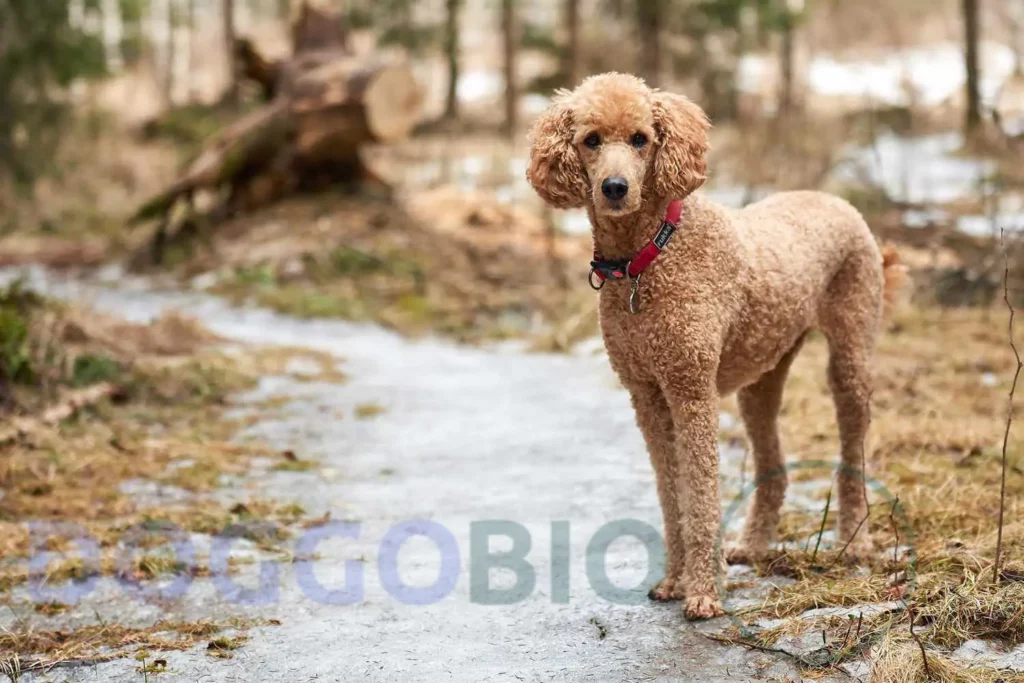
Poodles, commonly associated with France, actually originated in Germany as water dogs, specifically for retrieving ducks from streams and ponds during hunts.
Later, they became a symbol of wealth in France when the wealthy used them as fancy companions. Despite their initial role, Poodles transitioned into ornate companion dogs.
Poodles come in three sizes – standard, miniature, and toy – and are adored by many as hypoallergenic furry friends. This is because they have hair instead of fur, which does not shed as much and produces less dander, making them an excellent choice for people with allergies.
Poodles are also known for their intelligence, affectionate nature, and high activity levels, and they excel in dog shows where grooming is essential.
What Does a German Shepherd Poodle Mix Look Like?
The German Shepherd Poodle mix is a captivating blend of wild and rugged charm.
- Their thick, unkempt coat bristles in various directions, enhancing their rustic allure.
- Their eyes, irresistibly sweet, are heart-melting.
- This hybrid sports ears that drape casually, contrasting the German Shepherd’s pointed ears and softening their demeanor.
- Yet, their solid, muscular build speaks volumes of their strength and agility.
- With well-defined physiques and long tails, they exude confidence and grace, leaving an indelible mark on all who encounter them.
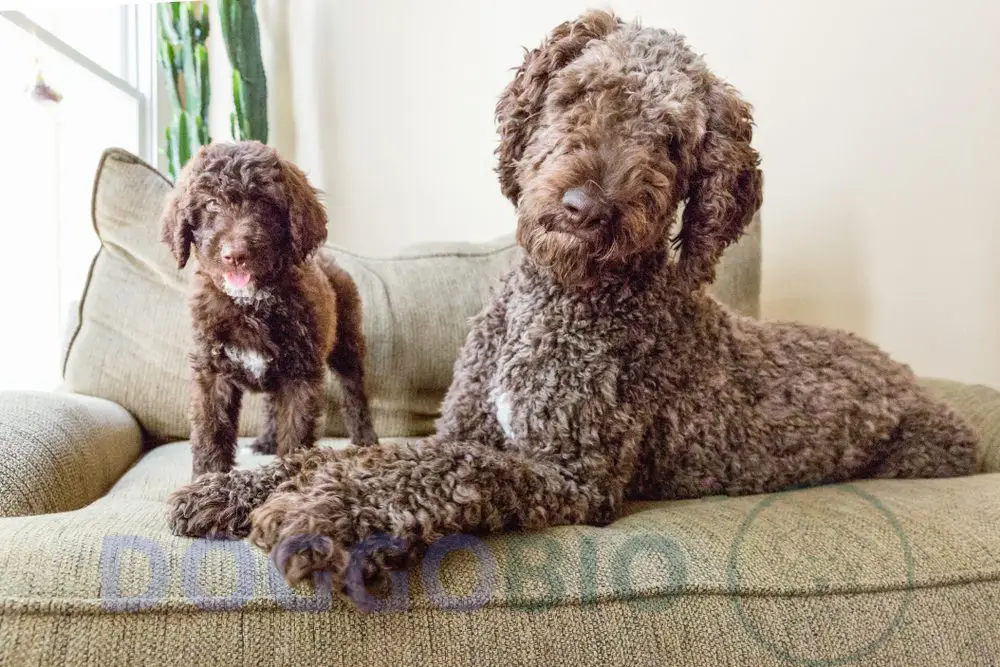
Size, height, and weight
When considering a German Shepherd Poodle mix, expect variability in size. These dogs typically range from 50 to 90 pounds, so prepare for your pet to possibly be on the larger or smaller side.
In terms of height, they are more consistent, usually standing between 22 and 28 inches at the shoulder, thanks to their taller parent breeds.
However, genetics can sometimes surprise you, so your pup might be slightly taller or shorter than this average range.
Coat colors and types
Shepadoodles boast a stunning array of coat colors, including black, white, tan, sable, and gray. Their coats are either wavy, similar to German Shepherds, or curly like Poodles.
The extent of shedding varies; a German Shepherd-like coat may shed more, whereas a Poodle-like coat tends to be low-shedding and hypoallergenic.
Temperament and Personality
The Shepadoodle, a mix of German Shepherd and Poodle, is an energetic and affectionate dog. They thrive on attention and can become attached family members. However, they may develop separation anxiety if left alone for extended periods.
Their strong bond with owners makes them ideal for military or service work, thanks to their intelligence and eagerness to learn. Keeping them mentally stimulated is essential.
While not frequent barkers, Shepadoodles will alert their family to strangers and are initially aloof with new people. Once trust is established, they offer unwavering loyalty and seek affection.
Is German Shepherd Poodle Mix a good fit for families?
Absolutely! These dogs are incredibly family-friendly and adore the company of children. However, it’s essential to supervise interactions and teach kids to treat them with respect and love.
Keep in mind that Shepadoodles may need extra attention to avoid separation anxiety, so be prepared to spend quality time with them.
Early socialization is key, starting at 2 1/2 weeks, to help them adapt to new environments and enhance family bonds. These dogs bring excitement and closeness to any household.
Are German Shepherd Poodle Mixes aggressive?
No, German Shepherd Poodle Mixes are not inherently aggressive. They may exhibit protective behavior and bark at perceived threats due to their German Shepherd lineage, but their Poodle heritage often tempers this, contributing to a more balanced disposition. Proper training and socialization are key to managing their protective instincts.
Training
The Poodle crossed with the German Shepherd dogs are potential therapy and service dogs, particularly in the military, but practical training is necessary for their behavior and skill acquisition.
Agility training suits these dogs, but training sessions can be stressful, so dog owners must be present to boost their morale. To achieve this, it is essential to follow these tips for training German Shepherd Poodles:
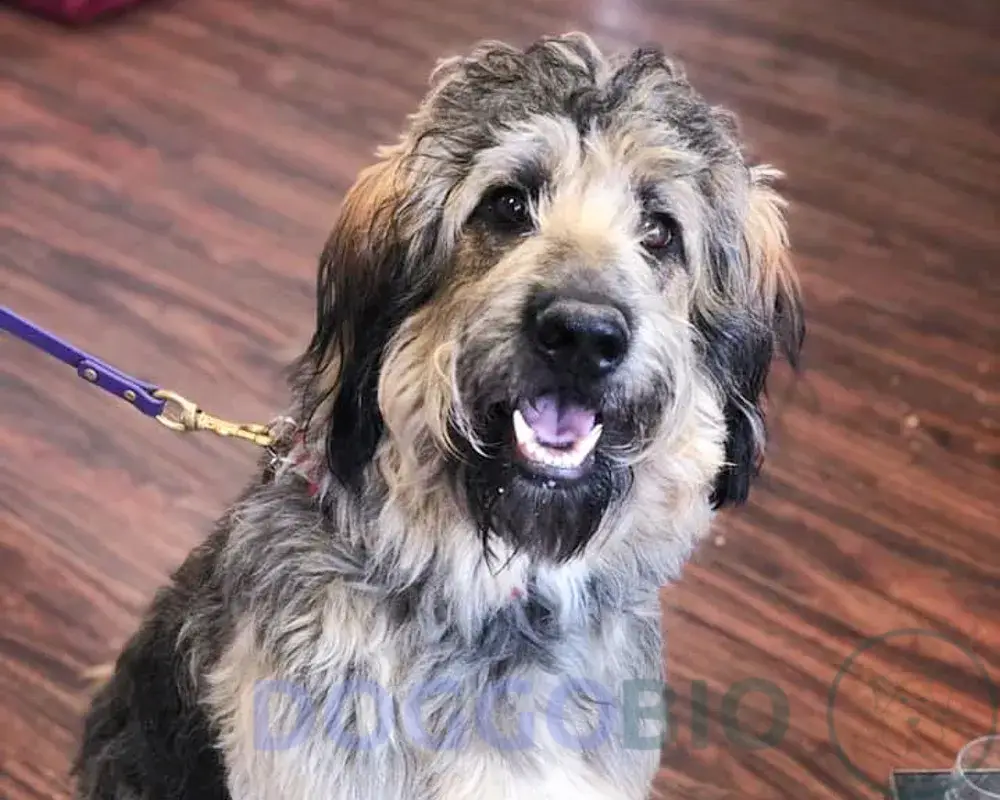
1. Positive rewards:
This system is effective and gentle, as dogs learn better in a supportive atmosphere. Positive words and gestures help reinforce learning and avoid negative emotions.
2. Never hit your dog:
This action could harm your relationship with the dog and result in antisocial personality traits.
3. Limit training sessions:
Misbehaviors often result from long training periods, which may be the dog’s way of expressing exhaustion. Therefore, shorter training sessions can help the dog focus better.
4. Take advantage of the dog’s young age:
Puppies learn the fastest among the age range of dogs. Training puppies consistently and reasonably can help them understand better.
Practical training can boost the relationship between the owner and the dog. However, if training proves too challenging, experienced dog trainers are available to help.
Exercise Requirements
Taking care of a German Shepherd Poodle mix means keeping them active.
These muscular dogs thrive on action, whether it’s running, hiking, swimming, or playing fetch. They need 1-2 hours of exercise daily, plus walks. Living in an apartment might not be ideal; they require space to roam.
Skipping exercise can lead to a moody and destructive pup. Aim for at least two daily walks and 90 minutes of exercise to keep them happy and prevent destructive behavior.
Living Conditions
Grooming a German Shepherd Poodle mix is essential, requiring regular brushing to manage their mild to moderate shedding and maintain their coat’s health.
- It’s also a chance to check for skin issues. Brushing 2-4 times a week, and daily during shedding seasons, keeps their coat in good condition.
- Bathe them only every few months with a gentle shampoo to preserve their skin’s natural oils.
Don’t forget to care for their teeth, nails, and ears, clipping nails as needed and brushing their teeth regularly for overall health.
| Grooming Need | Frequency |
| Hair Brushing | Daily |
| Bathing | Every week |
| Ear Cleaning | Every 4 weeks |
| Tooth Cleaning | 2 to 3 times a week |
| Haircutting | Every 4 to 8 weeks |
| Nail Trimming | Every 2 to 3 weeks |
Are German Shepherd Poodle Mixes Hypoallergenic?
“Yes!” These furry friends are hypoallergenic, which is excellent news for anyone with allergies or sensitivities.
You see, the hypoallergenic nature of Shepadoodles is due to their low-shedding coat and minimal dander production. They also don’t drool much, which is a bonus.
However, it’s worth noting that if your Shepadoodle takes after its German Shepherd parent, it may not be 100% hypoallergenic. So, keep that in mind when making your decision.
Food and Diet
German Doodles’ dietary needs vary based on size and activity. Smaller dogs may require 2 cups daily, while larger ones may need up to 4 cups. Consult a vet for personalized guidance.
Feed them 2-3 meals daily to prevent bloat. Opt for a low-carb, high-protein diet to avoid obesity.
Always provide fresh water, especially during exercise or hot weather. Avoid giving table scraps to prevent obesity and digestive problems.
| Calories Per Day | Cups of Kibble Per Day |
| 900-1400 | Approximately 3 cups |
Common Health Issues
The German Shepherd Poodle Mix dog breed is generally healthy, but like all dogs, it can be prone to a few common health issues that owners should be aware of.

1. Hip dysplasia
Hip dysplasia is a gnarly health condition that can inflict on your beloved furry companion. This disorder occurs when the hip joint grows abnormally, causing pain and discomfort for your pet. Surgery may be the only way to correct the issue in some cases.
2. Epilepsy
Epilepsy is a complex neurological disorder that can trigger seizures in various forms. Sadly, there is no known cure for epilepsy, but medication and other treatments can help manage its symptoms and reduce the frequency of seizures.
3. Gastric torsion
Bloat, or gastric torsion, is a grave condition when the stomach becomes distended with gas and rotates. This can result in a life-threatening situation, and prompt veterinary care is necessary to save your furry friend.
4. Allergies
Allergies are a common issue for German Shepherds and Poodles; their hybrid, the Shepadoodle, is no exception. These allergies can present in many forms, such as skin, food, and environmental.
While medication can help control these allergies, some dogs may require lifelong treatment to manage their symptoms.
You must monitor your Shepadoodle’s behavior and symptoms and work with your veterinarian to find the best treatment plan for your furry friend.
5. Perianal Fistula
This condition affects the anal area of dogs, including Shepadoodles, although it’s rare. Symptoms include difficulty defecating, constipation, and excessive licking.
Treatment options include antibiotics, steroids, immunosuppressants, and occasionally surgery to remove affected tissue and provide relief.
6. Eye issue
When it comes to eye health, Shepadoodles may experience a variety of issues. Cataracts, progressive retinal atrophy, and glaucoma are common conditions affecting your furry companion’s eyes.
These eye problems range from mild to severe and may require different treatments. Surgery or medication may be necessary, depending on the condition’s severity. As always, it’s crucial to watch for any symptoms and visit a veterinarian promptly if you notice anything concerning.
7. Elbow dysaplasia
Elbow dysplasia is a bone and joint condition that causes the elbow to develop abnormally, causing pain and discomfort to your furry companion.
Elbow dysplasia is common in large dog breeds like German Shepherds and Poodles. Surgery may be needed to correct this condition, and in some cases, lifelong medication may be necessary to keep the symptoms under control.
8. Hemophilia
Hemophilia is a perplexing condition that can cause blood to not clot properly. This can lead to excessive bleeding from even minor injuries and can be life-threatening in severe cases.
Hemophilia treatment is often required for a lifetime and can include regular infusions of clotting factors and medications to prevent bleeding episodes.
How Long Does a German Shepherd Poodle Mix Live?
The lifespan of the German Shepherd Poodle Mix, also known as the Shepadoodle, is noteworthy, clocking in at a solid 12 to 14 years, surpassing that of purebred German Shepherds.
However, the lifespan of your Shepadoodle can vary depending on various factors, such as genetics, diet, exercise, and overall health. Proper care and attention make it not uncommon for some Shepadoodles to live even longer!
How Much is a German Shepherd Poodle Mix?
A German Shepherd Poodle Mix can range from $600 to $2,000. While it may seem like a hefty price tag, it’s a fair deal for a hypoallergenic dog that can live up to 14 years.
Plus, the price can vary depending on location, breeder reputation, and the pup’s pedigree. So, it’s best to research and find a reputable breeder who can provide you with a healthy and happy Shepadoodle dog.
Is a German Shepherd Poodle Mix The Right Dog For You?
Before adopting a Shepadoodle, assess if it’s the right fit for your lifestyle. They have high energy levels and demand ample exercise and training.
Ensure you have the time and space for their needs. If your schedule is hectic or you can’t commit to their exercise and training requirements, this breed may not be suitable.
However, if you can meet these demands, Shepadoodles make exceptional, hypoallergenic, intelligent, and loyal family companions.”
List of dogs that are similar to German Shepherd Poodle Mix
- Poodle-French Bulldog Mix
- Poodle-Dalmatian Mix
- Poodle-Saint Bernard Mix
- Poodle-Pitbull Mix
- Poodle-Corgi Mix
- Poodle-Shiba Inu Mix
- Cavapoo
- German Shepherd-Chihuahua Mix
- German Shepherd-Cane Corso Mix
- German Shepherd-Catahoula Mix
- German Shepherd-Greyhound Mix
- German Shepherd-Shiba Inu Mix
- Blonde German Shepherd
Frequently Asked Questions
Are German Shepherd Poodle Mixes good dogs?
Yes, German Shepherd Poodle Mixes are good dogs. They combine the German Shepherd’s trainability and loyalty with the Poodle’s hypoallergenic coat, making them suitable for families, allergy sufferers, and those seeking a cleaner home. They are also intelligent, affectionate, and playful, fitting well into homes with children or other pets.
What is another name for German Shepherd Poodle Mix?
The Poodle German Shepherd Mix, also known as a Shepadoodle, can go by several monikers, depending on who you ask. Some call them German Shepherd Poodles or Shepherdoodles, while others prefer the more exotic-sounding Germandoodle. You might even refer to them as a Shepapoo if you’re feeling particularly whimsical.
Conclusion
In conclusion, the German Shepherd Poodle mix, or Shepadoodle, is a lovable and intelligent breed recently gained popularity. Its hypoallergenic coat and versatile skills make it a sought-after family pet and service dog.
This hybrid breed requires adequate exercise, mental stimulation, and socialization to thrive, but it can make an excellent companion with proper care. Whether you’re looking for a loyal friend or a skilled working dog, the Shepadoodle is a perfect choice for anyone who appreciates this breed’s unique blend of traits.

Pingback: Corgi Poodle Mix: Powerful Secrets You Need to Know 2023
Pingback: Saint Berdoodle: Unique Characteristics of this Mix 2023
Pingback: Lab Shiba Mix: Exploring the Best of Both Worlds 2024
Pingback: German Shepherd Greyhound Mix: Graceful Fusion 2024
Pingback: Dalmatian Poodle Mix :Get to Know the Fascinating Facts 2024